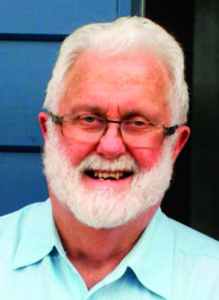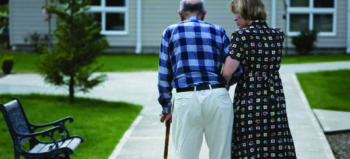When Frailty Hits Home

By Fr Kevin Bates SM
We do enjoy our own and each other’s high achievements. In sport, artistic endeavours, economic benchmarks, scientific breakthroughs, newly-married love all provide us with delight, awe and wonder, and give us a sense that all is right with the world.
We’d love to think that these times of achievement and joy are available to everyone. They reassure us, or at least give us the illusion that we are in charge and that we can win through any challenge. Along with these we could add religious perfection, physical beauty, popularity and fame.
The stars of Australian Ninja Warrior and their ilk tell us how amazing we can all become!
We don’t much like the idea that we are frail, mortal, elderly, sick. Our glamour, superior skills, business success, political power don’t really last very long when we sit back and take the longer view.
In our frailty we can become fearful, fearful that what we have lost will never return and fearful that our future may not be as we once imagined.
Here too anger can have its way as questions arise that we never thought were relevant to us, questions whose answers we cannot predict or control, questions which may have no obvious answers for us at all.
In times of both success and frailty, our self seems usually to be the centre of our world. This is natural and almost automatic if we are living un-reflective lives. It is, if you like, ‘the way of the world’.
This way of the world, so often accepted as ‘normal’, is not sustainable. The planet is not big enough to accommodate the needs of all the brilliantly successful and the wounded, fearful egos who populate the earth.
The poverty, exploitation, folly and violence that result are evidence of this. They occupy a majority of news bulletins and current affairs programs, not to mention the pages of the glossy gossip magazines that we devour with such alacrity.
We enjoy watching the rise and fall of others, so long as we stay a safe distance and keep out of their way.
 The experience of suffering makes little sense to us until we learn to be at home with mystery, with questions that seem to have no answers and with the wisdom that calls us to seek meaning that our brilliance and talents alone cannot provide.
The experience of suffering makes little sense to us until we learn to be at home with mystery, with questions that seem to have no answers and with the wisdom that calls us to seek meaning that our brilliance and talents alone cannot provide.
The devoted parents of a child with disabilities, the heroism of a firefighter, the dedication of a doctor whose patients matter most, all give us cause for admiration. In the presence of suffering and frailty, they simply love.
The open arms of the one on the Cross call us to a place where our self is no longer at the centre of things. Here it is that love has a chance to do its transforming work. Here, Jesus calls us to courage and even heroism in our times of greatest weakness.
In his own frailty, he gifts us with a love that no suffering can snuff out. He experiences the fear, frustration and anger that is common to all of us, and at the end of the day, it is his love that is still standing when the rising of the sun on Easter morning sheds its transforming light on the events of Good Friday.
It is this love that sustains us in our suffering times. The great saints have shown this again and again, as have the people in our own community and families who have allowed love to have the final word in their times of suffering and even death.
St Paul reminds us that when we are weak then we are strong, for it is then that God’s grace gets its chance to shape us.
May we allow that saving grace to be ours.
 Entries(RSS)
Entries(RSS)